Five Memoirs that Guys in their Twenties Should Read
Stories That Help Make Sense of the Big Questions
I work on a regular basis with people between the ages of 17 and 25. As a community college English teacher, I am tasked with helping students write the 5-paragraph essay, find credible sources online and write clearly. I walk into work every day hoping to help students enjoy writing rather than viewing it as a soul-sucking chore. However, many times factors that have nothing to do with writing/English determine whether a student ends up passing my class.
Here’s a question I try to ask my students at the beginning of the semester: “Why are you here at the community college in 2017?” Students who can answer this question with confidence are more likely to be willing to do whatever it takes to complete my class. If you know why you are attending community college, pushing yourself to complete classes and assignments that you hate becomes more tolerable.
I’ve found that the men that I teach at the community college struggle with answering this question more than women. After counseling multiple students about why they are attending college and hearing the reasons students drop my class, I think the way to help the guys graduate from community college is to help them with their motivation and goal-setting. I have similar discussions with female students about why they might drop my class, but it is often related to being over-committed or over-whelmed with life.
I think the best way to "find your purpose" or "get motivated" is to read. That's what I do. Reading is an excellent method to help a person fight through those paralyzing, coming of age questions: (1) What path am I on? (2) Who am I? (3) What is the meaning of my life? (4) Why can't I find clear direction in my life? (5) What do I do when I’ve failed miserably? (5) How do I find a career that I will actually enjoy? (6) How do I become a respectable person? (7) How do I respond to tragedy?
I’ve made a list of five memoirs that I think make sense of the questions I’ve listed above. Reading helps me "get logical" whenever I am seriously confused. These are all books that I call “weeknight reading.” These books have motivated me on those Tuesday nights when I’m not feeling thrilled about going to work the next day. It is not good to get punched in the face by one of the 7 questions I've listed above on a weeknight. I want to stay logical during the week so I can make it through the work-week. All 5 books were either written by guys in their twenties or are stories about guys struggling to overcome common twenty-something obstacles.
1.) “Hillbilly Elegy: A Memoir of a Family and Culture in Crisis” by J. D. Vance
J.D. Vance is the story of how a boy who was the son of a drug addict eventually went on to graduate from Yale Law school. Vance is only 31 years old. He was raised in southern Ohio by former “hillbillies.” He spends the first few chapters of the book talking about how the Kentucky hillbilly culture has shaped his family. The later 2/3 of the book is talking about how he is attempting build a functional life for himself in the face of poverty.
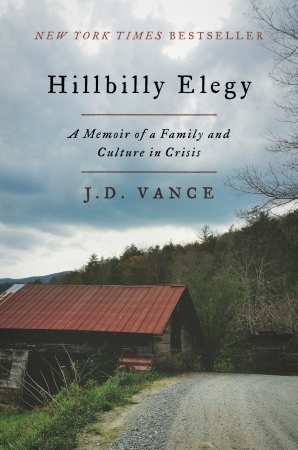
I saw this book at the airport back in December of 2016. Judging by the cover, I figured it was written by a 65-year-old man, nostalgically reflecting on life in the Appalachian Mountains in the 1960’s and 1970’s. Thankfully, that’s not the case. A 32-year-old Millennial wrote this book about his experience in southern Ohio attempting to escape the poverty in the Appalachian Mountains. Vance is only 32 years old and is telling a story of survival. He’s interested in giving people living in poverty hope. He says this “Whenever people ask me what I’d most like to change about the white working class, I say, “The feeling that our choices don’t matter.”
Twenty-Something Struggle: How does a person respond to the pressures of their circumstances? Vance’s story is centered around the difficult circumstances that he was surrounded by while growing up. Most of it is centered around his dysfunctional family and Vance’s failure to do well in high school. He was a mediocre student in high school, but he uses the military to gain life experience and the ability to pay for his undergrad degree at Ohio State.
I find this book very hopeful and insightful. I’m not the only one. Earlier this year, Vance’s book was the #3 book on Amazon Books. As of June 3, 2017 it is #12 overall. I like Vance’s story because it is a template of how he got through the military, undergrad at Ohio State and then into Yale Law School. Reading this book was like watching a movie. It’s the best book I’ve read in 2017.
2.) Jay Williams: “Life is not an Accident: A Memoir of Reinvention”
Jay Williams was the 2nd overall pick of the 2002 NBA draft. He led the Duke Blue Devils to a championship in 2001. Williams arrived in the NBA at a time when teams were actively seeking point guards who could shoot, drive and pass. Everything was falling into place in his life, until he wrecked his motorcycle at the age of 22, the summer after his rookie season with the Chicago Bulls. This ended his career as a basketball player, yet the book tells the whole story about how he regained his identity and direction in life after seemingly losing it.
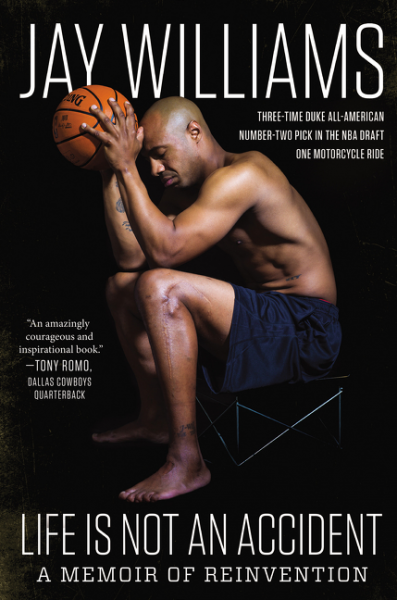
Williams recounts the glory days playing at Duke and all of the hope he had for his life as an NBA player. However, he recounts stories of failure and what the motorcycle crash did to his body. One memorable scene in this book is when Williams is attempting to return to the NBA after his injury. There's one scene where he trained with Raymond Felton, who was preparing for the NBA draft. Sadly, Felton beat him easily because his foot was not working the same anymore. While Williams kept pushing his body, the motorcycle accident permanently injured his knee that took away the explosiveness that made him a great point guard. It took him a long time to give up his dream of playing in the NBA.
Williams went through a dark time when he was became depressed and even contemplated suicide. His honesty about this period of his life is one of the most interesting parts of this book. I like this part of the book because we often think that pro athletes live these incredibly easy and happy lives where they experience no struggle, pain or sadness. Jay Williams story debunks that myth.
Twenty--Something Struggle: Williams’s disappointments in his mid-20's were centered around what he would do after he realized he could not play professional basketball. What other options did he have? I consider this to be a central struggle of most people’s 20’s: what do you do when your life-long dream doesn’t work out? What other options do you have?
Williams tries out being a college basketball commentator. What I love about Williams’s story is that he found an identity apart from being an athlete. I think many American men grow up thinking of themselves as an athlete. The transition for American men today to think of themselves in another profession is essential. Williams story is an example of finding an alternative dream. Life doesn't always conform to the blueprint that we’ve set out in our mind.
Unexplainable suffering is hard to understand and personal mistakes can haunt you, but how do you deal with these things? Now what are we going to do about it?
3.) “A Heartbreaking Work of Staggering Genius” by Dave Eggers
The first 75 pages of "A Heartbreaking Work of Staggering Genius" were annoying to me. But as I read on, something about Eggers writing drew me in. One page of his book he might be funny, the next page snarky and then serious. Eggers, a dude writing about his life in San Francisco in the mid 90's, slowly gained my respect. Specfically is Eggers mixture of SAT vocabulary with commonly used Gen X phrases and pop culture references. One third of this book is Eggers recreating the process he went through in being a finalist to get onto MTV's the Real World: San Francisco (1994). One third of the book is Eggers attempting to make sense of his parents’ death from cancer and then another about helping raise his little brother Christopher while he attempts to start a hipster magazine in San Francisco.
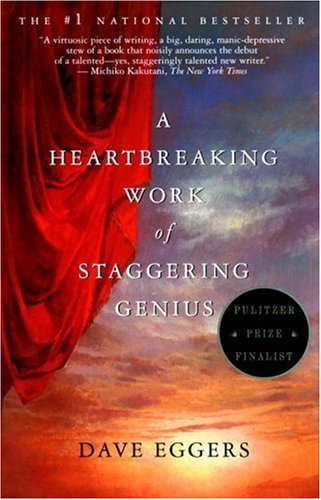
Along with the Eggers seamless inclusion of pop culture into in his memoir, is his ability to narrate his own thoughts to the reader and it still be interesting. Most people's thoughts reported to a reader, might seem silly, boring and self-centered. His book attempt to put thoughts into writing, sometimes regardless of grammar or sentence structure, the subconscious thoughts reported to the reader. While Eggers did not make it onto MTV's the Real World, the San Francisco producers asked him if they could shoot a scene in the building he published his magazine called Might. At this point, we enter into Eggers mind trying to "act right" on television. Here is Eggers thoughts on his clothes while being in TV:
“We are wearing what we always wear, shorts and T-shirts, having decided, after thinking about what to wear and then remembering not to think about what to wear, to wear what we would have worn had we not been thinking about what to wear. We are happy with our shorts and T-shirts, one side tucked in, just an inch of it on the right side, showing some belt, the rest hanging out-this is our look—it having been arrived at in high school through careful consideration, through the eschewing of so many possible mistakes. We wear no tattoos, because we feel tattoos indication too much attention paired to one’s look and anyway, though the trend is still on the upswing in 1994, we are sure that inside a year, maybe just only a few months, that whole boon will go bust.”
Why is it interesting? Eggers is honest about the mental thought process of attempting to present himself on MTV. He is narrating his own thought process, and this shows us his extreme self-consciousness. While the idea of tattoos going out of style in 1994 never happened (the thought of it is hilarious) Eggers explaining his own pretentious thought process summed up my own self-awareness when I read this book at 22 .
Twenty-Something Struggle: Eggers self-aware voice, ability to integrate 90’s pop-culture references and constant mocking of all the people in San Francisco make this an entertaining read. The process of establishing your post-college self is one of the most overlooked aspects of American life. Eggers book focuses in on this stage of life with humor(see the title). Yet book verbalizes Eggers's serious questions about dealing with the tragic death of his parents and how weird it feels to him to be raising his little brother in his mid-twenties. This book offers many confessional-like chapters of the awkwardness of being in your twenties, with less answers on how to cope with the big questions.
4. Josh Riebock “Heroes and Monsters: An Honest Look at the Struggle Within All of Us”
Riebock's memoir, published in March of 2012, focuses on his teenage years through his early thirties. The book primarily deals with Riebock's resentment towards his father and also attempting to find his identity during college. This could be considered experimental memoir since Riebock mixes his life story with what seems to be a fictional character named Jack meant to represent Jesus Christ. He uses this fictional character to recreate conversations with God, situated into his real life. His memoir emphasizes narrating internal monologues in contemporary language for the reader. I personally love this, since I have an internal monologue going in my head most of the day.
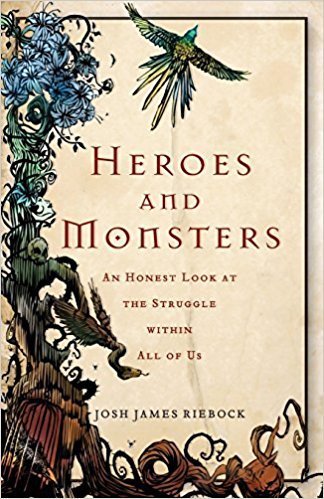
Josh James Riebock's parents both unexpectedly die while Riebock is in his early twenties. Riebock's memoir raises similar questions to Eggers (book mentioned above): what do you do when both your parents have passed away? Do you have holidays with your siblings? Where is home now? Riebock and Eggers seem to have the narrative of moving from Chicago to start their lives over after their parents have died.
What makes Riebock's book appealing is that he is very open about his own insecurities and his American family's serious dysfunction. Riebock moves from Chicago to Colorado to go to college. He explains why he goes to college:
"So now I just want to get away, far away, to leave life as I know it in the rearview mirror. I want to find a beautiful place, a place with different people, people who will like me, people who I will like, a place where my problems and fears will be different, a place with different restaurants and different smells and a different sky."
After meeting his college room-mates he says "Overall, it seems to be a good system, and they are good guys, but I'm not sure if we'll be friends or not, and more than anything else, that's what I want from Colorado, I don't want the college degree, or the mountains, or the raging rowdy, college nights. I want friends." Riebock’s conclusions about himself seem to be laid out for the reader, as if he is discovering it himself for the first time. Riebock's thoughts in this book put into words common goals and desires the common 21st century American male is thinking about, yet may not be fully cognizant that those goals and desires are what are driving him. Reading Riebock helps us see these things. I do not like the cover of this book, but I do love this about his writing style.
Twenty-Something Struggle: Riebock’s story is a good reflection of the inner thoughts of a Millennial twenty-something. His book represents the kind of identity questions that most guys kick around during college and post-college. And that’s what we get when we read a book: we obtain the specific phrases and language to articulate to ourselves what our lives are about. For Riebock, he is able to articulate his inner conversational life with God-----the gratitude, the confusion and desperation.
5. [“Shaken: Discovering Your Identity in the Midst of Life’s Storms” by Tim Tebow]
It’s easy to dismiss celebrity memoirs. I typically expect them to be full of fluff, mediocre writing and filled with clichés. One of the problems of Tim Tebow’s memoir is that it does have one too many clichés in it. If I were his editor, I would rephrase some of Tebow’s writing to make it more fresh. However, the simple stories that Tebow tells give us an impression of what fueled him during the hard parts of his life.
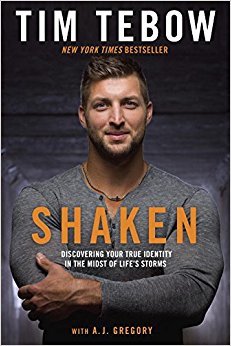
I’ve always been curious about Tebow’s life because he never seems to be angry, snarky, bitter or discouraged about being harshly criticized by many American sports fans. His college football career at Florida and then his NFL career made him one of the most talked about athletes in America for nearly 10 years. Now, he’s out of football since he never made it in the NFL. Yet I’ve always wondered “How did Tim Tebow stay so mentally and emotionally strong? How did take the take all that criticism without visibly getting angry?” He seems so optimistic over the years. How?
Twenty-Something Struggle: How does a person stay civil and optimistic in the midst of ruthless critics? Often times twenty-somethings transition from high school to the real world or college to a career where we are in the midst of people who do not respect or understand us. We make the transition from a big fish in a small pond, to a small fish in a huge pond. Can we handle being humbled? Do we allow the criticism to make us do something stupid? Or do we grow?
Tebow’s book is aimed at the situation of keeping your head straight and also staying hopeful when the people around you are against you. Tebow is not someone who is living in theory. His character has been publicly tested for years. After reading this book I have started to memorize particular passages of the Bible because that’s what Tebow has done over the years. Tebow implies in his book that understanding what God thinks about him and the rest of the world is more important than what the world thinks about him. And it seems to have kept him sane and stable over the years.